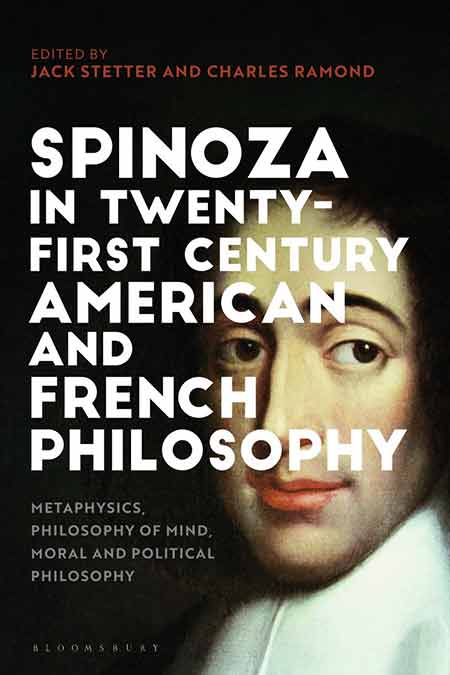Spinoza in Twenty-First Century American and French Philosophy
Jack Stetter, Charles Ramond
Over recent decades, Spinoza scholarship has significantly developed in both France and the United States, shedding new light on the work of this major philosopher. Spinoza in Twenty-First-Century American and French Philosophy systematically unites for the first time American and French Spinoza specialists in conversation with each other, illustrating the fecundity of bringing together diverse approaches to the study of Early Modern philosophy.
Spinoza in Twenty-First-Century American and French Philosophy gives readers a unique opportunity to discover the most consequential and sophisticated aspects of American and French Spinoza research today. Featuring chapters by American scholars with French experts responding to these, the book is structured according to the themes of Spinoza’s philosophy, including metaphysics, philosophy of mind, moral philosophy and political philosophy. The contributions consider the full range of Spinoza’s philosophy, with chapters addressing not only the Ethics but his lesser-known early works and political works as well. Issues covered include Spinoza’s views on substance and mode, his conception of number, his account of generosity as freedom, and many other topics.
![]() I- Metaphysics. Edwin CURLEY (“Spinoza’s Metaphysics Revisited”), Pierre-François MOREAU (“A Response : On Spinoza, Possible Worlds, and Pantheism”) ; Michael DELLA ROCCA (“The Elusiveness of the One and the Many in Spinoza : Substance, Attribute, and Mode”), Pascal SÉVÉRAC (“A Response : In What Way It Exists”) ; Yitzhak Y. MELAMED (“The Earliest Draft of Spinoza’s Ethics”), Mogens LAERKE (“A Response : Accidents and Modifications : an Additional Note on Axioms 1 and 2 in Appendix of the Short Treatise”) ; Martin LIN (“Metaphysical Rationalism”), Valérie DEBUICHE (“Leibniz’s Principle of (Sufficient) Reason and Principle of Identity of Indiscernibles”) ; Simon B. DUFFY (“The Transformation of Relations in Spinoza’s Metaphysics”), Céline HERVET (“A Response : Essence, Variations in Power, and ‘Becoming Other’ in Spinoza”) ;
I- Metaphysics. Edwin CURLEY (“Spinoza’s Metaphysics Revisited”), Pierre-François MOREAU (“A Response : On Spinoza, Possible Worlds, and Pantheism”) ; Michael DELLA ROCCA (“The Elusiveness of the One and the Many in Spinoza : Substance, Attribute, and Mode”), Pascal SÉVÉRAC (“A Response : In What Way It Exists”) ; Yitzhak Y. MELAMED (“The Earliest Draft of Spinoza’s Ethics”), Mogens LAERKE (“A Response : Accidents and Modifications : an Additional Note on Axioms 1 and 2 in Appendix of the Short Treatise”) ; Martin LIN (“Metaphysical Rationalism”), Valérie DEBUICHE (“Leibniz’s Principle of (Sufficient) Reason and Principle of Identity of Indiscernibles”) ; Simon B. DUFFY (“The Transformation of Relations in Spinoza’s Metaphysics”), Céline HERVET (“A Response : Essence, Variations in Power, and ‘Becoming Other’ in Spinoza”) ;
![]() II- Philosophy of Mind. Alison PETERMAN (“Spinoza’s Two Claims about the Mind-Body Relation”), Jack STETTER (“A Response : A Puzzle in Spinoza’s Views on the Mind-Body Problem”) ; Knox PEDEN (“Spinoza’s True Ideas : Suggestive Convergences”), Pascale GILLOT (“A Response : Althusser, Spinoza and the Specter of the Cartesian Subject”) ; Michael A. ROSENTHAL (“Spinoza on Beings of Reason [Entia Rationis] and the Analogical Imagination”), Jacqueline LAGRÉE (“A Response : Analogia and Ens Rationis”) ;
II- Philosophy of Mind. Alison PETERMAN (“Spinoza’s Two Claims about the Mind-Body Relation”), Jack STETTER (“A Response : A Puzzle in Spinoza’s Views on the Mind-Body Problem”) ; Knox PEDEN (“Spinoza’s True Ideas : Suggestive Convergences”), Pascale GILLOT (“A Response : Althusser, Spinoza and the Specter of the Cartesian Subject”) ; Michael A. ROSENTHAL (“Spinoza on Beings of Reason [Entia Rationis] and the Analogical Imagination”), Jacqueline LAGRÉE (“A Response : Analogia and Ens Rationis”) ;
![]() III- Moral philosophy. Steven NADLER (“Spinoza on Good and Bad”), Lorenzo VINCIGUERRA (“A Response : “The Knowledge of Good and Bad”) ; Hasana SHARP (“Generosity as Freedom in Spinoza’s Ethics”), Ariel SUHAMY (“A Response : A Generous Reading”) ;
III- Moral philosophy. Steven NADLER (“Spinoza on Good and Bad”), Lorenzo VINCIGUERRA (“A Response : “The Knowledge of Good and Bad”) ; Hasana SHARP (“Generosity as Freedom in Spinoza’s Ethics”), Ariel SUHAMY (“A Response : A Generous Reading”) ;
![]() IV- Political Philosophy. Daniel GARBER (“Obedience in Spinoza’s Tractatus Theologico-Politicus”), Chantal JAQUET (“A Response : Logic of the Superstitious, Logic of the Pious”) ; Steven BARBONE (“Individual and Communityand its American Legacy”), Laurent BOVE (“A Response : Between Matheron and Spinoza, Something Happens…”) ; Jonathan ISRAEL (“Spinoza’s Formulation of the Radical Enlightenment’s Two Fundational Concepts : How Much Did He Owe to the Dutch Golden Age ?”), Charles RAMOND (“A Response : Spinoza’s Paradoxical Radicalism”).
IV- Political Philosophy. Daniel GARBER (“Obedience in Spinoza’s Tractatus Theologico-Politicus”), Chantal JAQUET (“A Response : Logic of the Superstitious, Logic of the Pious”) ; Steven BARBONE (“Individual and Communityand its American Legacy”), Laurent BOVE (“A Response : Between Matheron and Spinoza, Something Happens…”) ; Jonathan ISRAEL (“Spinoza’s Formulation of the Radical Enlightenment’s Two Fundational Concepts : How Much Did He Owe to the Dutch Golden Age ?”), Charles RAMOND (“A Response : Spinoza’s Paradoxical Radicalism”).
Index nominum, Index locorum, Bibliography.
Date de parution : 7/02/2019
Editeur : Bloomsbury Academic - ISBN : 978-1-35006-731-8 - Format 15,6 x 23,4 - Nombre de pages : 396


